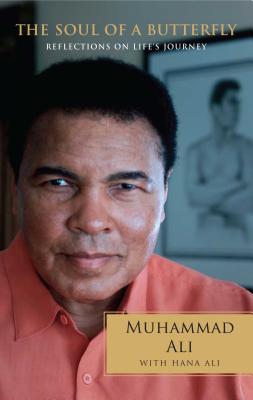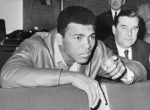Earlier this month, a collective groundswell of emotion rippled round the world as the public mourned the man once known as Cassius Clay.
Boxing champ Muhammad Ali was a household name. Even in a country that reveres sports heroes, being an African American, or a Muslim, or labeled by some as a draft dodger in the 1960’s could have been a career stopper, yet he managed to transcend much of the usual stereotypical bigotry generated from race, religion and politics.
I’m not a boxing aficionado, but I was curious to learn what propelled Ali into what seems to be a league of his own.
 Before his fight with George Foreman, Ali rhapsodized his infamous, “Float like a butterfly, sting like a bee,” but the fascinating thing about butterflies is their metamorphosis. Ali’s autobiography, “The Soul of a Butterfly: Reflections on Life’s Journey” helps describe his controversial metamorphosis and some of his greatest wins, from both inside and out of the boxing ring.
Before his fight with George Foreman, Ali rhapsodized his infamous, “Float like a butterfly, sting like a bee,” but the fascinating thing about butterflies is their metamorphosis. Ali’s autobiography, “The Soul of a Butterfly: Reflections on Life’s Journey” helps describe his controversial metamorphosis and some of his greatest wins, from both inside and out of the boxing ring.
This book isn’t densely packed with detail (it’s a quick read). It lacks much of the braggadocio, bravado and bluster that I associated with Ali and that he owns up to creating to shape his stage persona. It weaves in a bit of his poetry (he admits some critics panned his work and also that he didn’t care), inspirational parables, and also insights from his daughter, Hana Yasmeen Ali, who is the book’s co-author.
Ali writes about some his life’s most momentous events in a fairly matter-of-fact way, skipping the hyperbole, but we can infer the emotions, like when he “lost” his Olympic gold medal:
“I had won the gold medal for America‒but I couldn’t eat at this restaurant in my hometown, where they all knew my name, where I was born in General Hospital only a few blocks away. I couldn’t eat in a restaurant where I went to school and helped the nuns clean the school. Now I had won the gold medal. But it didn’t mean anything because I didn’t have the right color skin…What I remember most about 1960 was the first time I took my gold medal off…Over the years I had told some people I had lost it but no one ever found it. That’s because I lost it on purpose. The world should know the truth…”
(If you want to learn where the ring is, you’ll have to read the book.)

“My decision is a private and individual one…I never regretted the decision I made that day.”
Four years later on June 28, 1971 (45 years ago TODAY), the U.S. Supreme Court upheld his rights as a Conscientious Objector. He no longer faced the specter of prison and his rights were reinstated, but he still had to win back his boxing championship title. He later regained that title—meanwhile, he had already won a personal victory as a different kind of champion.
It is Ali’s spiritual beliefs (and his respect for those of others), his belief in God and his desire to be ambassador of peace that are prominent aspects the book. After his diagnosis of Parkinson’s disease, he found that, “It was faith that restored my sense of purpose and self-confidence. My faith gave me back my joy and enthusiasm for life. I think maybe my Parkinson’s is God’s way of reminding me of what is important: for example, how we treat each other…”
And towards the end of the book, there is this:
“I would like to be remembered as a man who won the heavyweight title three times, who was humorous and treated everyone right. As a man who never looked down on those who looked up to him, as a man who helped as many people as he could. As a man who stood up for his beliefs no matter what. As a man who tried to unite all humankind through faith and love. And if that’s too much, then I guess I’d settle for being remembered only as a great boxer who became a leader and a champion of his people. And I wouldn’t even mind if folks forgot how pretty I was.”
 I don’t think that we will soon forget.
I don’t think that we will soon forget.